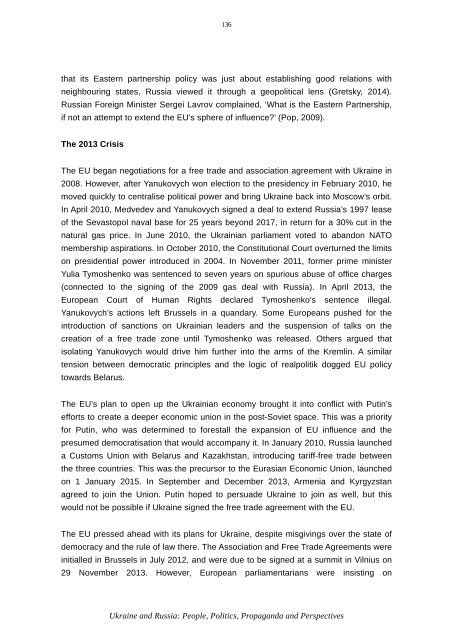Ukraine-and-Russia-E-IR
Ukraine-and-Russia-E-IR
Ukraine-and-Russia-E-IR
You also want an ePaper? Increase the reach of your titles
YUMPU automatically turns print PDFs into web optimized ePapers that Google loves.
136<br />
that its Eastern partnership policy was just about establishing good relations with<br />
neighbouring states, <strong>Russia</strong> viewed it through a geopolitical lens (Gretsky, 2014).<br />
<strong>Russia</strong>n Foreign Minister Sergei Lavrov complained, ‘What is the Eastern Partnership,<br />
if not an attempt to extend the EU’s sphere of influence?’ (Pop, 2009).<br />
The 2013 Crisis<br />
The EU began negotiations for a free trade <strong>and</strong> association agreement with <strong>Ukraine</strong> in<br />
2008. However, after Yanukovych won election to the presidency in February 2010, he<br />
moved quickly to centralise political power <strong>and</strong> bring <strong>Ukraine</strong> back into Moscow’s orbit.<br />
In April 2010, Medvedev <strong>and</strong> Yanukovych signed a deal to extend <strong>Russia</strong>’s 1997 lease<br />
of the Sevastopol naval base for 25 years beyond 2017, in return for a 30% cut in the<br />
natural gas price. In June 2010, the Ukrainian parliament voted to ab<strong>and</strong>on NATO<br />
membership aspirations. In October 2010, the Constitutional Court overturned the limits<br />
on presidential power introduced in 2004. In November 2011, former prime minister<br />
Yulia Tymoshenko was sentenced to seven years on spurious abuse of office charges<br />
(connected to the signing of the 2009 gas deal with <strong>Russia</strong>). In April 2013, the<br />
European Court of Human Rights declared Tymoshenko’s sentence illegal.<br />
Yanukovych’s actions left Brussels in a qu<strong>and</strong>ary. Some Europeans pushed for the<br />
introduction of sanctions on Ukrainian leaders <strong>and</strong> the suspension of talks on the<br />
creation of a free trade zone until Tymoshenko was released. Others argued that<br />
isolating Yanukovych would drive him further into the arms of the Kremlin. A similar<br />
tension between democratic principles <strong>and</strong> the logic of realpolitik dogged EU policy<br />
towards Belarus.<br />
The EU’s plan to open up the Ukrainian economy brought it into conflict with Putin’s<br />
efforts to create a deeper economic union in the post-Soviet space. This was a priority<br />
for Putin, who was determined to forestall the expansion of EU influence <strong>and</strong> the<br />
presumed democratisation that would accompany it. In January 2010, <strong>Russia</strong> launched<br />
a Customs Union with Belarus <strong>and</strong> Kazakhstan, introducing tariff-free trade between<br />
the three countries. This was the precursor to the Eurasian Economic Union, launched<br />
on 1 January 2015. In September <strong>and</strong> December 2013, Armenia <strong>and</strong> Kyrgyzstan<br />
agreed to join the Union. Putin hoped to persuade <strong>Ukraine</strong> to join as well, but this<br />
would not be possible if <strong>Ukraine</strong> signed the free trade agreement with the EU.<br />
The EU pressed ahead with its plans for <strong>Ukraine</strong>, despite misgivings over the state of<br />
democracy <strong>and</strong> the rule of law there. The Association <strong>and</strong> Free Trade Agreements were<br />
initialled in Brussels in July 2012, <strong>and</strong> were due to be signed at a summit in Vilnius on<br />
29 November 2013. However, European parliamentarians were insisting on<br />
<strong>Ukraine</strong> <strong>and</strong> <strong>Russia</strong>: People, Politics, Propag<strong>and</strong>a <strong>and</strong> Perspectives


